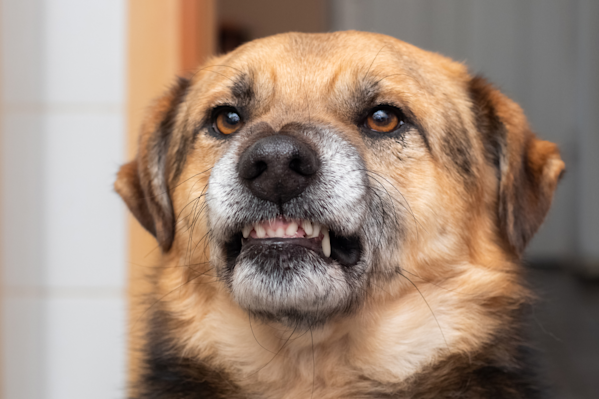Bite wounds can happen suddenly and unexpectedly. It’s often over in an instant and you’re not even sure exactly what happened. Two dogs that know each other can get carried away playing, or social cues are missed at the dog park. Housemates can scuffle over toys or food or attention.
Sometimes the damage is obvious, sometimes it isn’t.
If your dog got bitten by another dog, it's important to understand exactly what's going on and the actions you need to take to get them help.
What happens when a dog bites another dog
Bites can cause puncture wounds—and that’s plural, because there are usually at least two. It’s hard to puncture just one tooth through the skin without opposing pressure from another.
Beyond the skin damage, tooth punctures can carry bacteria deep into the tissues, where certain kinds of bacteria like to grow in the absence of air (“anaerobic” bacteria). These bugs can fester and form abscesses, which are pockets of infection that swell under the skin. With typical dog bites, there’s often a lot of skin pulling, too, which can create large spaces under the skin. Sometimes these spaces get filled with blood (“hematomas”), but combine this stretched out space with the bacteria from a tooth puncture, and you have the ideal situation for a serious abscess to form.
Think of the process of an abscess forming like a glorified pimple. At first, the bump is red and hard and it hurts, but you can’t squeeze anything out of it (this stage is called “cellulitis”). As the infection “organizes”, white blood cells and bacteria collect into a fluid center, like when a pimple forms a white head that can be popped. Like pimples, abscesses can take days to move through this process, too.
Another kind of swelling under the skin can happen when a dog gets bitten in the throat area. Air from damaged tissue in the respiratory system can collect under the skin (“subcutaneous emphysema”), increasing with each breath. This can crackle like bubble packing, can inflate large areas of tissue over time, and depending on the specific location of the injury, may signal breathing problems.
Do I need to go to the vet if my dog got bitten?
Yes. Ideally, right away. Getting treatment sooner is a chance to prevent complications.
Your doctor will start by shaving hair away from the area of the suspected injury. Hair can hide punctures ( …there’s usually more than one, right?) and it can also trap contamination and infection in the skin. If puncture holes are found, they can be flushed with antiseptic solution to help prevent infection and potential abscess formation. If very large areas of space are found under the skin, increasing the risk of an abscess, your doctor may elect to sew in rubber tubing that prevents those anaerobic bacteria from hiding away from oxygen, allowing infection to drain out of the body rather than festering deep inside it.
If your dog got bitten in the throat area, or in the belly, x-rays may be needed to assess for penetration into deeper body cavities. Bites to the legs can also break bones.
Medications can help make your dog more comfortable and prevent complications. Antibiotics, either administered by injection or orally, can treat an existing infection or help prevent one. Anti-inflammatory medications can reduce the swelling that causes pain. Sometimes actual pain medications, often with a sedative component, can help with comfort and reduce your dog’s anxiety during recovery, because unfortunately this kind of tissue crushing injury can be painful and take time to improve.
Whether the injury is a puncture, abscess, scrape, or bruise, often applying a gentle warm compress to the area can help by increasing circulation to the area. Using a clean, warm, wet towel can draw out and absorb any contamination or accumulated fluid that needs to exit the tissues. Alternately, cool compresses can help reduce swelling and numb pain. When applying either a warm or cool compress, watch your dog carefully for their reaction—if one or the other is uncomfortable for them, forcing it on them will only add to their stress.
An advancement in veterinary medication is the widespread use of therapeutic lasers that use a certain frequency of light to speed tissue healing. Your vet may be able to set you up to come into the office for short, contactless sessions, about every other day, which many dogs find low stress and beneficial.
If you just happen to find a bite wound on your dog and don’t know how it happened, your doctor may recommend a booster of their rabies vaccine. This would definitely be the case if you know the encounter was with some form of wildlife. Thankfully, rabies is pretty uncommon when problems occur between domesticated animals, even if you don’t know the other dog's vaccine status.
If your dog got bitten and you're unsure about what to do next, reach out to the team at Pawp—we're here to help 24/7, no appointment necessary.
